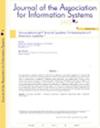是你的错吗?用公正世界理论构建社交媒体包容与排斥
IF 5.5
3区 管理学
Q1 COMPUTER SCIENCE, INFORMATION SYSTEMS
引用次数: 0
摘要
经历过他人、组织或不良事件伤害(也称为受害者)的个人有时会使用社交媒体与他人分享他们的经历,搜索信息,并寻求社会支持。虽然一些观察者在社交媒体上为受害者提供支持和包容,但其他观察者将受害者的困境归咎于受害者,并参与再次受害和排斥。指责受害者可能导致社会排斥,对社会中已经面临被排斥风险的人造成不成比例的影响,并可能使现有的种族、族裔、性别和经济不平等现象永久化。这项研究提供了一个理论框架,以确定观察者在社交媒体上对受害者做出如此广泛回应的原因。具体而言,我们考虑了特定类型的行动者(观察者)之间的社会现象(受害者责备),理论(公正世界理论)和信息技术工件(社交媒体)的融合的社会包容和排斥。我们的社交媒体包容和排斥的理论框架是由公正世界理论提供的,并考虑了社交媒体功能如何促进社交媒体的包容或排斥。我们还提供了研究问题,以激发与社交媒体包容,社交媒体排斥和公正世界理论相关的未来研究。本文章由计算机程序翻译,如有差异,请以英文原文为准。
Is it Your Fault? Framing Social Media Inclusion and Exclusion Using Just World Theory
Individuals who have experienced harm (also known as victims) by people, organizations, or adverse events sometimes use social media to share their experiences with others, search for information, and find social support. While some observers offer support and engage in inclusion toward victims on social media, other observers blame victims for their plight and participate in revictimization and exclusion. Victim blaming, which can lead to social exclusion, disproportionately impacts those in society who are already at risk for exclusion and may perpetuate existing racial, ethnic, gender, and economic inequalities. This research provides a theoretical framework to identify reasons why observers engage in such wide-ranging responses to victims on social media. Specifically, we consider social inclusion and exclusion at the confluence of a social phenomenon (victim blaming), a theory (just world theory), and an information technology artifact (social media) among a specific type of actor (observers). Our theoretical framework of social media inclusion and exclusion is informed by just world theory and considers how social media functionalities can promote social media inclusion or exclusion. We also offer research questions to stimulate future research related to social media inclusion, social media exclusion, and just world theory.
求助全文
通过发布文献求助,成功后即可免费获取论文全文。
去求助
来源期刊

Journal of the Association for Information Systems
工程技术-计算机:信息系统
CiteScore
11.20
自引率
5.20%
发文量
33
审稿时长
>12 weeks
期刊介绍:
The Journal of the Association for Information Systems (JAIS), the flagship journal of the Association for Information Systems, publishes the highest quality scholarship in the field of information systems. It is inclusive in topics, level and unit of analysis, theory, method and philosophical and research approach, reflecting all aspects of Information Systems globally. The Journal promotes innovative, interesting and rigorously developed conceptual and empirical contributions and encourages theory based multi- or inter-disciplinary research.
 求助内容:
求助内容: 应助结果提醒方式:
应助结果提醒方式:


